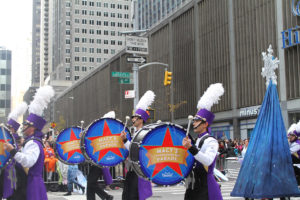To some young adults, alcohol may seem like an unavoidable part of their college experience. Marching bands across the country are finding solutions that keep their members safe and performing at their best.
When the Blue Band of Pennsylvania State University traveled to Jacksonville, Florida, this past winter, band members brought a little 1920s flair with them. But their roaring 20s pizzazz didn’t appear in the pregame or halftime shows they performed during the Jan. 2, 2016 TaxSlayer Bowl; it came from the New Year’s Eve party they hosted two nights before. While the city of Jacksonville may have been ringing in the start of 2016 with glasses of champagne, the Blue Band was celebrating its season of success at an alcohol-free, “Great Gatsby”-themed celebration.
Gregory Drane, Penn State’s director of athletic bands, allocated a small budget for the band’s student leadership to put the party together but left all the planning to the students themselves. “I told them to create a party nobody wanted to miss,” Drane says.
Rather than mandating how students spend their free time, Drane prefers to instill an understanding of professionalism in his students and create safe environments for them, so they aren’t faced with a tempting decision. “I believe if you give students the opportunity to meet your expectations, they will do it,” he says.
Setting Expectations
While a level of trust in band students is necessary, it’s also important that directors and staff make their expectations known early on. At the University of Iowa, students have a clearly outlined alcohol policy detailed in the Hawkeye Marching Band’s handbook—which states that students may not consume alcohol or illegal drugs while wearing any part of their band uniform or while traveling on an official university-sponsored trip—or else they risk being sent home at their own expense as well as being expelled from the band. When the band travels on overnight trips, a university police representative and physician accompany the group to ensure safety and proper conduct.
According to Kevin Kastens, director of the Hawkeye Marching Band, it’s important that students understand the consequences to their actions. “Due to nationally publicized situations in recent years, they have learned how fragile a band’s public reputation can be,” Kastens says. “They don’t want that to happen here.”
In addition to making the rules clear, students have to know that all rules are consistently enforced. According to Kastens, one student has been removed from the Hawkeye Band this year and another last year, both for alcohol policy violations. “Having a student removed from our band is quite the deterrent,” he says.
Kastens also imposes a curfew on his students when the band travels. To make sure that the curfew is enforced, he has his graduate assistants perform room checks to confirm that all students are in their hotel rooms by the designated time. Curfews also ensure that students are ready to face early wake-up calls and a hectic practice schedule the next day.
Because of standards set throughout the season, the Hawkeye Band had smooth travels when representing the university at the Tournament of Roses in Pasadena, California, this past winter. “All band members know how prestigious this trip is!” Kastens says.
Staying in Shape
For many schools, the term “athletic band” means more than a band that supports the sports teams; band members are often expected to be athletes themselves. At schools like the University of Michigan, where the band is known for combining complex music with physically demanding drill, the need to stay in shape can be enough of a deterrent to avoid excessive drinking. “It’s not physically possible for them to do what they’re being asked to do if they’re inebriated,” says Andrea Brown, associate director of the Michigan Marching Band.
Much like Iowa, Michigan’s band members fully understand the university’s policies regarding drinking and public behavior when on trips. At the beginning of the season, students sign a contract agreeing not to consume alcohol—or be under the influence—while at an official band gathering or while wearing any part of their band uniform. Students know that if they violate any of these policies, they will not be able to perform with the band.
Besides its clear policies, Michigan encourages smart behavior by allowing only the best performers onto the field at each game. Before each game or performance, student leaders will evaluate each member of their section based on their marching and playing abilities. The best performers participate in pregame and halftime for that week’s game. Students know it’s in their best interest to stay in top shape and refrain from unhealthy behaviors. “It is pretty competitive to be in the performance block every game,” Brown says.
 Trusting Students
Trusting Students
Dr. Andrew Yozviak, West Chester University’s director of bands, believes that a culture of musical excellence combined with a sense of trust in his students keeps the kids out of trouble. When the “Incomparable” Golden Rams Marching Band traveled to New York for the Macy’s Thanksgiving Day Parade in 2015, Yozviak gave the students free time to explore the city on their own as long as they were always on time for rehearsals. “The kids who were old enough went to bars,” he says. “They were always where they needed to be and in a state conducive to a great performance.”
This sense of trust comes from a mutual understanding among students and staff about when drinking is appropriate and when it’s not. “We’re not naive enough to think college kids don’t participate in activities like that,” Yozviak says. “If that’s something you’re into, you can do that anytime. It seems silly to sacrifice a great performance. That might be part of the agreement we have with each other. We don’t beat down on them so much.”
Taking Pride
For schools like West Chester, where the band often travels independently of the football team, every trip is an opportunity to focus on musical excellence. “The opportunities we have don’t come up as often as they might if [we] were a Division I school,” Yozviak says. “Kids really appreciate the opportunities. I don’t think they would do anything to jeopardize their level of performance.”
Regardless of division or conference, taking pride in a good performance often serves as the greatest motivator for students. At Michigan, students aim to put on a great performance for every crowd, whether at a bowl trip or a standard home game. “We’re working with such intelligent students, and they understand that they’re performing in front of the largest live football crowds in the country,” Brown says.
Similarly, at Penn State, students value the privilege of playing in the Blue Band and take each performance seriously. “Spots for performing in a band like the Blue Band are so limited and competitive,” says graduate assistant Jonathan Mountain.
Penn State fosters a culture of pride in its band program by showing the band how important it is to the university as a whole. This year, head football coach James Franklin visited with the Blue Band twice to get them pumped up for the season. Each year, Penn State’s president Eric J. Barron and his wife host a luncheon or cookout for the Blue Band at their house. The Blue Band also has a tradition where, during the third quarter of every home game, the university president comes over to the stands and conducts the band. “We’re very connected,” Drane says.
Additionally, Drane likes to let the students know that they’re appreciated. On a few occasions, after returning from a trip, Drane will receive a complimentary email from someone they encountered while traveling. He always makes sure to share these emails with the students as a way to motivate them to keep up the good work.
Last season, the Blue Band accompanied the Nittany Lions football team to an away game against the University of Maryland. Upon returning to Pennsylvania, Drane received an email from someone at the hotel where they stayed. “They were checking out, and they were shocked to see that 350 students were in the hotel with them,” remarking on how quiet the band members remained during their stay, Drane recounts. “They commented how everybody they encountered said, ‘Good morning.’ We’re very fortunate to have good and polite students.”
Overall, band directors agree that the best way to avoid issues with student drinking on band outings is not to strictly monitor or control students but rather to inspire students to act professionally even when nobody’s watching. “Policies and rules are necessary, but what has helped the Blue Band is a culture that decides to value success in performance over distractions that would hinder that success,” Mountain says. “Instill in students a pride in what they do, and the rest will come naturally.”


